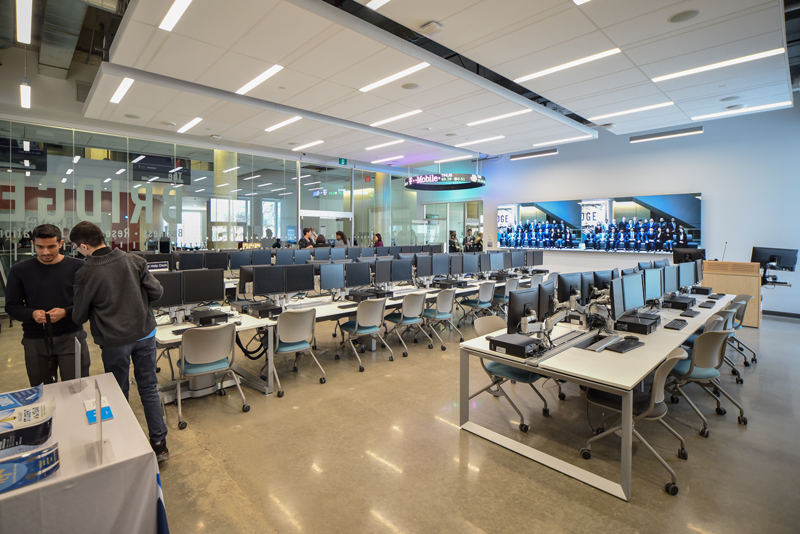A new academic learning space for finance, management and entrepreneurship is open for business at U of T Scarborough.
With an advanced trading lab on one end, a state-of-the-art boardroom on the other, and a connection to the largest academic library system in Canada in the middle, The BRIDGE is ready to start living up to its name.
Located on the first floor of the Instructional Centre (IC), the BRIDGE is a marriage of three long-standing partnerships. In 2013, the Finance and Trading Lab opened as a joint venture between the Library and the Department of Management. But the lab and the Department of Management were in IC, while the library was located across the campus.
“We believe The BRIDGE can leverage the Finance and Trading Lab’s model and expand its service to other management areas, such as entrepreneurship,” says Jason Wei, professor of finance in the Department of Management.

Equipment and technology from the Finance and Trading Lab have found a new home at The BRIDGE Lab. The lab includes computers, screens, stock tickers, Bloomberg terminals and other tools to find specific information on markets, firms and industries. While its focus is finance, it is open to anyone who has taken introductory management courses.
The lab is also an experiential centre, and a place for students to learn research methods for all areas of management. Earlier this year, The BRIDGE hosted the inaugural Data Analytics competition, where students used their data training to predict what would happen while watching a Toronto Raptors game.
The space also houses The BRIDGE Library, which is open to all students and offers a lounge space to host seminars, business videos and networking conversations. Physical copies of business books, magazines and newspapers are alongside access to a vast online database. Library staff also support students in using research tools to help create and support businesses.
The boardroom, which lies to the left of the library, is a flexible space for use by student clubs, startups and others for pitches and meetings. It will also act as hoteling space for student startups and clubs working on an external project.
“As the name tells us, this bridges everything,” says fourth-year management student Maggie Wang, who often used the Finance and Trading Lab and is excited to use The BRIDGE.
“Now, you have multiple channels of information sitting in the same location, so it’s easier to get a better picture and expertise.”

The BRIDGE will also support U of T Scarborough’s master of accounting and finance program (MAccFin), the first of its kind in North America, and U of T’s first double degree in quantitative finance and statistics.
“Our fundamental commitment to research and education is encapsulated in The BRIDGE,” said Vice-Principal and Dean Bill Gough during the recent grand opening of the new space.
“We share a vision of what this space can be, not just a sandbox or playground, but a new home for entrepreneurship.”
A new space for entrepreneurs
For fourth-year management student Fareeha Husain, the appeal of The BRIDGE is two-fold — a state-of-the-art facility, and a place where “there would always be a plethora of entrepreneurial ideas in the air.”
Before opening its doors, The BRIDGE had already attracted more than $400,000 in funding to support student-led work integrated learning in the Toronto East region.
The BRIDGE will also house the New Venture Program (NVP), a mentorship initiative to give students individualized, academically-focused support in starting businesses. Four students have already been accepted as the first cohort.
There are 15 different entry points for students and their businesses. These were developed to ensure that, for example, a first-year history student receives all the management training they need, while a fourth-year management student would not have to repeat what they already learned.
The NVP is focused on developing corporate innovators, from entrepreneurs starting their own businesses to intrapreneurs (people who innovate within existing businesses).
“I wanted everyone to get sufficient training in a lot of these areas so that they really develop the right analytic skills,” says Bill McConkey, who will head the program. “We want to form people with great analysis, marketing and strategy skills.”
But the reality is that few people succeed in their first attempts at entrepreneurship. McConkey says this is why the academically rigorous program also works to teach students the frameworks and models to learn where a business may have gone wrong.
“We want failure to breed wisdom. If you fail and you don’t know why you failed, it’s hard to learn,” McConkey says. “But if you failed within a framework, then you start to see what you can do differently and have a greater shot at winning.”
On Feb. 15, the space will also host #TheBRIDGEHack, a tri-campus sports management hackathon that will include Olympian Sarah Wells, founder of the Believe Initiative. Students can sign up here.



